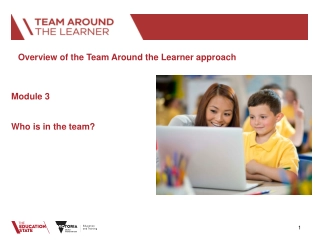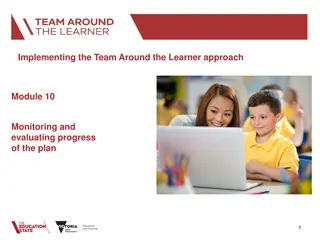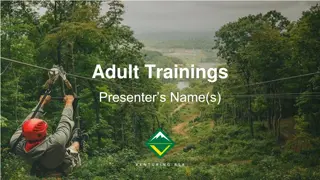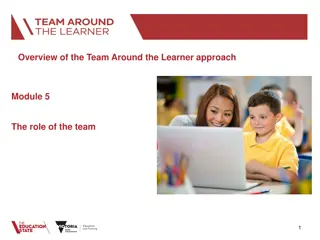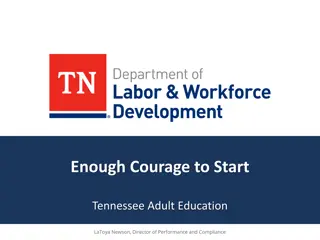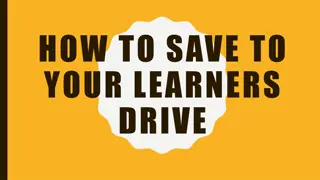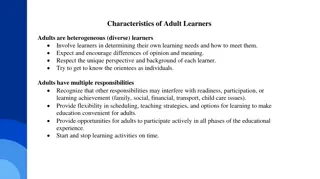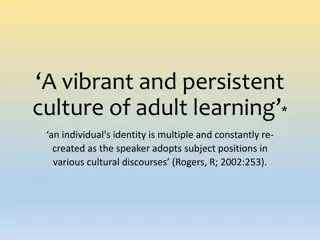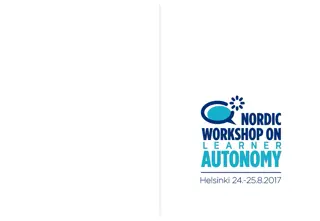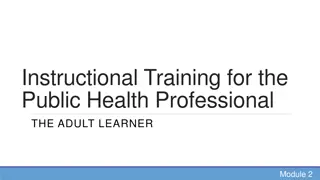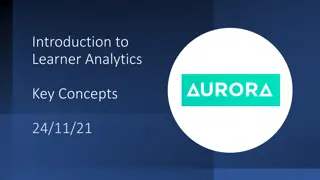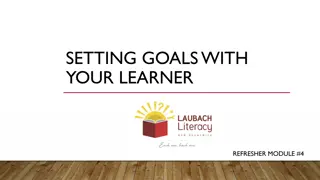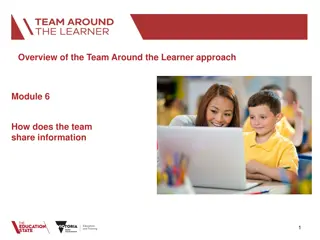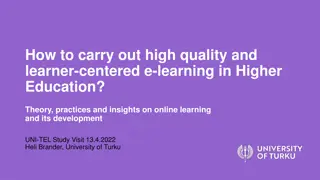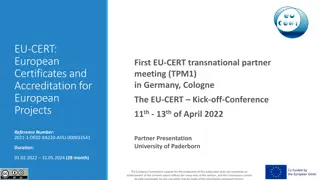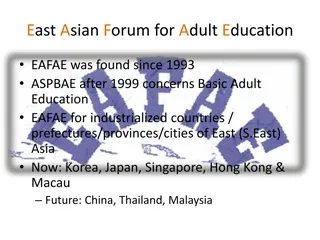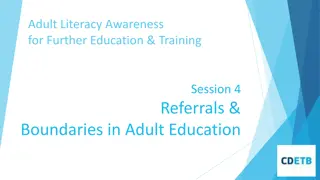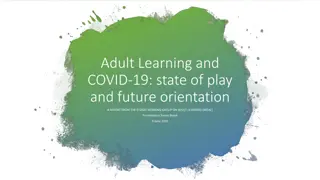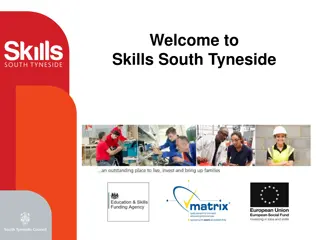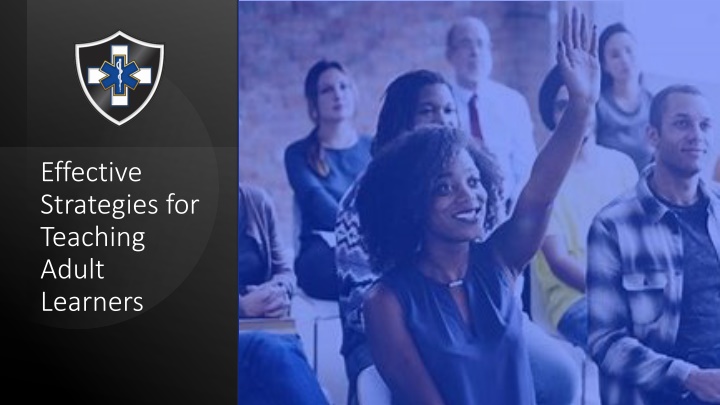
Effective Strategies for Teaching Adult Learners: Andragogy Principles and Real-world Application
Explore the principles of andragogy for teaching adults, emphasizing self-directed learning, relevance, and problem-centered instruction. Learn how to create a comfortable environment, promote active participation, and use active learning methods to tap into adult learners' life experiences for effective teaching.
Download Presentation

Please find below an Image/Link to download the presentation.
The content on the website is provided AS IS for your information and personal use only. It may not be sold, licensed, or shared on other websites without obtaining consent from the author. If you encounter any issues during the download, it is possible that the publisher has removed the file from their server.
You are allowed to download the files provided on this website for personal or commercial use, subject to the condition that they are used lawfully. All files are the property of their respective owners.
The content on the website is provided AS IS for your information and personal use only. It may not be sold, licensed, or shared on other websites without obtaining consent from the author.
E N D
Presentation Transcript
MABPRO INSTRUCTOR DEVELOPMENT Effective Strategies for Teaching Adult Learners
Andragogy Definition of Andragogy Principles of Andragogy Andragogy refers to the theory and practice of adult education. It emphasizes techniques and approaches that are specifically tailored to the unique learning needs of adults, recognizing their self-directed nature and prior experiences. 1. Self-directed Learning: Adults are motivated to learn by internal factors and seek control over their learning. 2. Experiential Knowledge: Adults bring rich life experiences to learning situations. 3. Relevance: Adult learning is most effective when it is relevant to their current roles and interests. 4. Problem-centered Instruction: Adult learners respond well to practical problem solving and application of knowledge. 5. Motivation: Adult learners are motivated when they see the direct relevance of the learning to their goals and challenges.
Relevance and Applicability Real-world Application Addressing Learners Needs Demonstrate the practical application of the learning material to adult learners real-world situations. Highlight how the knowledge gained directly impacts their roles, responsibilities, and career advancement. Emphasize the alignment of course content with the specific needs and interests of adult learners. Ensure that the material is tailored to their professional and personal goals and challenges.
Creating a Comfortable Environment Active Participation Community Building Positive Atmosphere Foster a positive and inclusive learning environment that respects the diversity of adult learners. Encourage open dialogue and expression of differing viewpoints while maintaining mutual respect. Engage adult learners by encouraging active participation and collaborative learning activities. Create opportunities for sharing perspectives and experiences, and validate different learning styles and preferences. Facilitate a sense of community among adult learners, where they can support each other and build meaningful connections. Acknowledge the value of peer learning and collaborative problem-solving.
Active Learning Methods Engagement Strategies Hands-on Activities Immediate Application Utilize techniques such as discussions, case studies, and role-playing to actively involve adult learners in the learning process. These methods facilitate meaningful interactions and immediate application of new knowledge. Incorporate hands- on activities and simulations that require critical thinking and problem-solving. Encourage adult learners to apply theoretical concepts to practical scenarios in a supportive learning environment. Promote immediate application of learning through real-world examples and practice exercises. Encourage adult learners to reflect on and apply new knowledge to their professional contexts.
Tapping into Life Experiences Encourage adult learners to share their diverse life experiences and insights with the class. Recognize the value of their prior knowledge and experiences in contributing to the overall learning process. Leveraging Experience
Self-Directed Learning Promoting Ownership Empower adult learners to take ownership of their learning process by allowing them to set goals, choose resources, and direct their learning trajectory. Provide guidance and support as facilitators of their learning journey.
Tips to Engage and Inspire Adult Learning... When instructing adult learners, it s essential to consider their unique characteristics and needs. Here are some tips to engage and inspire adult learners: Relevance: Ensure that the content is relevant to their work performance or personal goals. Adult learners need to see how the learning experience will benefit them. Active Learning: Design activities and assignments that encourage adult learners to explore the subject matter on their own. Let them arrive at solutions independently or collaborate in groups to discuss issues1. Assess Audience: Consider their experience and educational background. Adult learners often have more life experience and a broader knowledge base. Tailor your content accordingly. Immediate Usefulness: Make sure the course content is immediately useful. Adult learners appreciate practical knowledge they can apply right away2.
Tips to Engage and Inspire Adult Learning... Respectful Environment: Create a welcoming and respectful learning environment. Adult learners value respect and professionalism. Engaging Content: Use engaging visuals, interactive elements, and real-world examples. Adult learners appreciate practical relevance. Clear Objectives: Clearly state the learning goals and how they relate to practical outcomes. Flexible Learning: Offer flexible learning options, such as self-paced modules or blended learning. Feedback: Provide constructive feedback to help adult learners improve. Tech Tools: Leverage technology-based tools for communication, collaboration, and assessment3. High-Touch Support: Offer personalized assistance when needed. High-touch helpers can guide adult learners through challenges4.
Teaching is a lifelong journey... Effective educators continuously learn and evolve. Here are some key aspects of this ongoing learning process: 1.Subject Mastery: Deep Understanding: Teachers strive for a deep understanding of their subject matter. They explore various resources, engage in research, and stay updated on new developments. Continuous Learning: Even after achieving mastery, teachers remain open to learning. They attend workshops, conferences, and collaborate with colleagues. 2.Pedagogical Knowledge: Effective Teaching Strategies: Teachers study pedagogical techniques to enhance their instructional skills. They learn about active learning, differentiated instruction, and assessment methods. Adaptability: As educational theories evolve, teachers adapt their practices to meet the needs of diverse learners. 3.Reflective Practice: Self-Reflection: Teachers regularly reflect on their teaching experiences. They consider what worked well, what needs improvement, and how to refine their methods. Feedback: Seeking feedback from students, peers, and mentors helps teachers grow. Constructive criticism guides their professional development.
Teaching is a lifelong journey... 4.Research and Innovation: Stay Curious: Teachers explore educational research, attend webinars, and read scholarly articles. They seek innovative approaches to engage students. Implement New Ideas: Teachers experiment with new tools, technologies, and teaching strategies. They adapt their classrooms to align with modern learning environments. 5.Collaboration and Networking: Professional Learning Communities: Teachers participate in PLCs (Professional Learning Communities) where they share ideas, discuss challenges, and learn from each other. Networking: Attending conferences and connecting with educators globally broadens their perspectives. 6.Student-Centered Approach: Know Your Learners: Effective teachers understand their students backgrounds, interests, and learning styles. They tailor instruction accordingly. Empathy: Teachers empathize with students struggles and celebrate their successes. This human connection fosters a positive learning environment. 7.Ethical Considerations: Ethical Decision-Making: Teachers continually evaluate their actions based on ethical principles. They prioritize student well-being and fairness. Remember, teaching is not just about imparting knowledge; it s about inspiring lifelong learning and nurturing curious minds.

